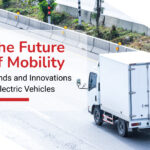
The Future of Mobility: Trends and Innovations in Electric Vehicles
The EV Surge: A Global Perspective
The Indian Context: A Growing Market
India stands out as a vibrant hub for electric vehicle adoption. In 2024, the country witnessed a dramatic rise in EV sales, with figures showing a 100% increase compared to the previous year. The Indian government has set ambitious targets to achieve 30% electric vehicle penetration by 2030. Several initiatives have been launched to support this goal, including subsidies for EV purchases and investments in charging infrastructure.
According to the Society of Indian Automobile Manufacturers (SIAM), EV sales in India crossed the one million mark in 2023. This rapid growth is primarily driven by two-wheeler and three-wheeler segments, which account for over 80% of total EV sales. With urban mobility becoming a pressing concern, these segments are shifting towards electric options offering lower operational costs and environmental benefits.
Key Trends Shaping the EV Ecosystem
- 1. Battery Technology Advancements : Innovations in battery technology are central to the EV revolution. The development of lithium-sulfur and solid-state batteries promises higher energy densities and faster charging times, addressing one of the main concerns for potential EV buyers—range anxiety. In 2024, companies like Tata Motors are investing heavily in research to enhance battery efficiency, aiming to reduce costs significantly in the next few years.
- 2.Charging Infrastructure Expansion : The growth of EVs is closely tied to the availability of charging infrastructure. India is rapidly expanding its charging network, with estimates suggesting that public charging stations could reach 10,000 by 2025. Government initiatives and private sector investments are fostering the installation of fast chargers in urban areas, making electric mobility more feasible for consumers.
- 3. Smart Mobility Solutions : Integrating smart technologies in EVs transforms our thoughts about mobility. Features such as vehicle-to-grid (V2G) technology allow EVs to supply energy back to the grid during peak demand periods, promoting energy efficiency. Companies like Mahindra Electric are in charge of developing smart EV solutions that leverage data analytics for improved performance and user experience.
- 4. Sustainability and Circular Economy : Integrating smart technologies in EVs transforms our thoughts about mobility. Features such as vehicle-to-grid (V2G) technology allow EVs to supply energy back to the grid during peak demand periods, promoting energy efficiency. Companies like Mahindra Electric are in charge of developing smart EV solutions that leverage data analytics for improved performance and user experience.
Consumer Awareness and Acceptance
Consumer perception is gradually shifting as awareness of the benefits of electric vehicles grows. A 2024 survey by Nielsen indicated that 75% of Indian consumers are now familiar with EVs, with a significant percentage expressing interest in purchasing one. Factors such as lower running costs, government incentives, and the desire for eco-friendly alternatives drive this change.
Social media and digital marketing play crucial roles in educating consumers about the advantages of EVs. As a result, more people are beginning to view electric vehicles not just as a sustainable choice but also as a viable and attractive option in terms of performance and style.
Conclusion: Driving Towards a Sustainable Future
The future of mobility is undeniably electric. As advancements in technology and infrastructure continue to reshape the EV landscape, countries like India are positioned to become leaders in this transformation. The trends of enhanced battery technology expanded charging networks, smart mobility solutions, and growing consumer awareness all contribute to a promising future for electric vehicles.
As we move forward, the commitment of governments, manufacturers, and consumers will be critical in realizing the full potential of electric mobility. By embracing these changes, we can reduce our carbon footprint and create a more sustainable and efficient transportation ecosystem for generations to come.



